Jonathan, profile of a president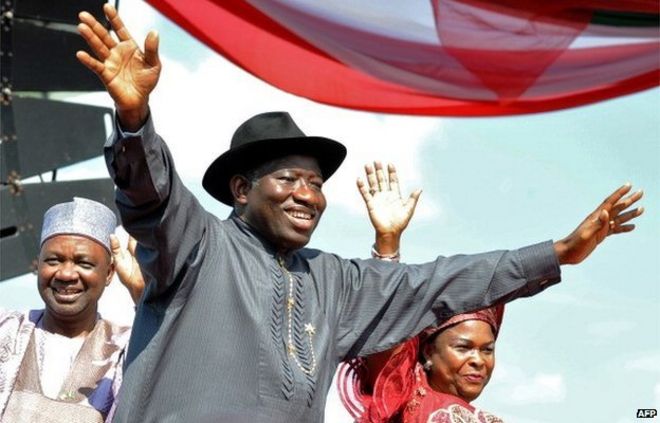
As his name suggests, Nigeria’s President Goodluck Jonathan has a habit of being in the right place at the right time.
Until November 2009, he was serving out his time as a low-key deputy from the south of the country to a low-key president from the north.
But then, President Umaru Yar’Adua was taken to hospital in Saudi Arabia and was not seen again in public until he died on 5 May 2010.
Step forward, Mr Jonathan. After months of political wrangling, Nigeria’s elite finally accepted him as acting leader in February 2010 when the ailing president returned home, but remained too ill to govern.
Barely 12 hours after Mr Yar’Adua’s death, Mr Jonathan was sworn in as the new president and commander-in-chief of the armed forces of Africa’s most populous nation – one of its most fractious democracies.
Not bad for a man who had never been elected to major public office in his own right.
‘Super pastors’
He defied the governing Peoples Democratic Party’s (PDP) tradition of alternating presidential power between north and south after two terms of office by winning the party’s primaries.
In 2011, he won his first election – for president – despite opposition claims of fraud, and is now seeking another four-year term in office

Goodluck Jonathan in focus:
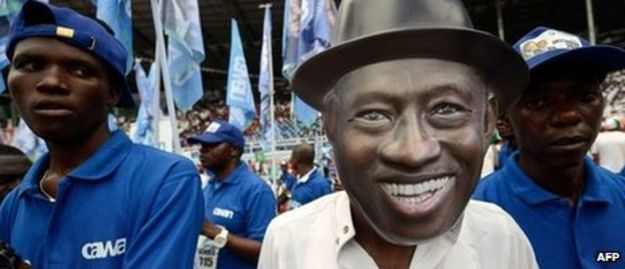
- Has a penchant for fedora hats
- Regular church-goer
- Middle name, Ebele, means “God’s wish”
- Fond of saying he never had shoes as a child because of poverty
- Told journalists in 2012 that he would not declare his assets because he did not “give a damn about it, even if you criticise me from heaven”
- Denied reports in 2014 that his net worth is about $100m (£62m)
Born in 1957 in the oil-rich Niger Delta region, Mr Jonathan is a Christian from the Ijaw ethnic group.
He is said to be extremely close to the “super pastors” of Nigeria’s hugely popular Pentecostal churches.
His family’s trade was canoe-making, but he studied zoology at university.
He worked as an education inspector, lecturer and environmental protection officer before going into politics in 1998.
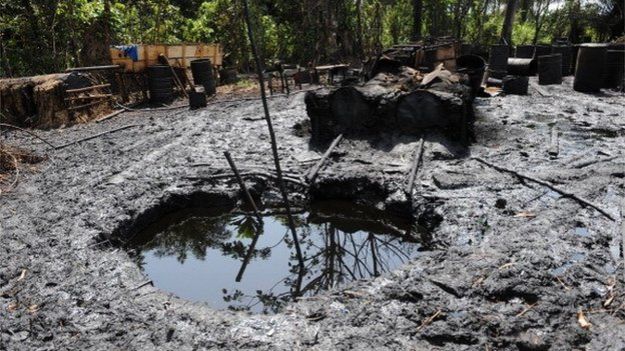
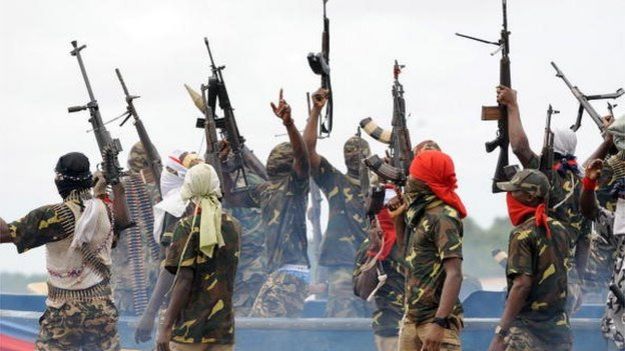
Just as his rapid rise to power in the federal government owed a lot to luck, so too did his promotion to state governor.
Elected as deputy governor for his home state, Bayelsa, in 1999, he was once again serving his time without particular distinction.
Until, that is, his boss was impeached on corruption charges.
‘Meteoric rise’
Mr Jonathan took over as governor and two years later was hand-picked by former President Olusegun Obasanjo to run on the PDP’s ticket as vice-presidential candidate in 2007.
PDP insiders regard him as a politician without a political base – and more of an administrator than a leader.
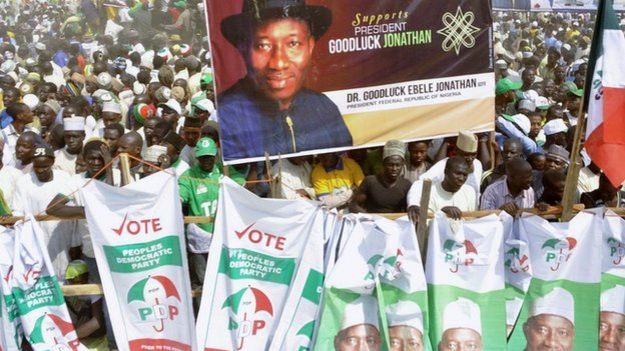
It had been suggested that Nigeria’s many groups of powerbrokers agreed to let Mr Jonathan formally become acting president only because he was not seen as a threat.
But he threw his hat into the ring at the PDP primaries and with several central and northern states backing him, proved his political acumen.
“There has not been any rise that’s been so meteoric in Nigeria,” analyst Charles Dokubo said in 2010.
On the relevance of the acting president’s name, he said: “What is luck? Luck is when you can take advantage of an opportunity. He was in the right place at the right time.”
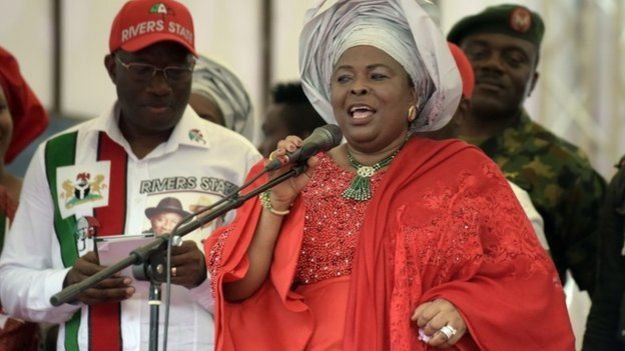
He told the BBC that Mr Jonathan was doubly lucky as his other given name is equally propitious – Ebele, which means “God’s wish”.
“That tells you that it was the wish of the parents for him to be successful,” he said.
Amnesty
His rise to power, though, has not been without its share of controversy.
His wife, Patience, was investigated by anti-corruption officials in 2006 over allegations she tried to launder some $13.5m (£8.5m).
She has never been convicted of any wrongdoing over the affair and officials told Associated Press news agency that the case was “an old one”.
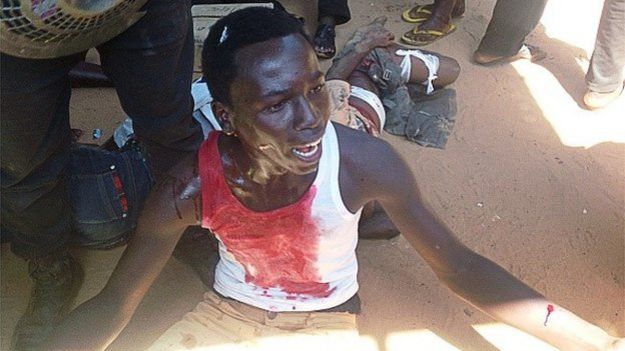
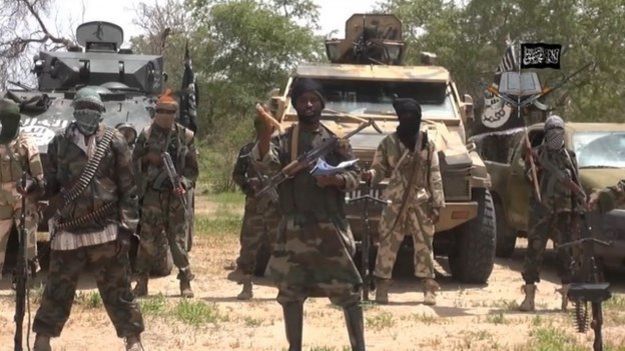
If Mr Jonathan’s time as vice-president was distinguished at all, it was through his negotiations with militants in the Niger Delta, who are mostly his fellow Ijaws.
Many of the major militant groups have laid down their weapons as part of a government amnesty.
Defections
But he has had no such luck in the north, where an insurgency by militant Islamist group Boko Haram has gained momentum under his rule.
It has led to his critics accusing him of being ineffectual – a charge he denies.
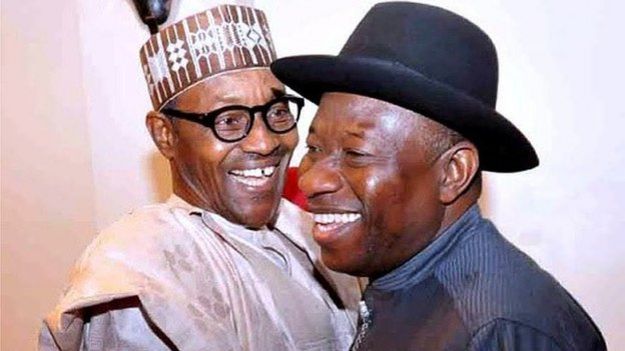
He suffered a major blow in December 2013 when Mr Obasanjo, his former backer, called on him to step down.
In a widely circulated 18-page letter, Mr Obasanjo accused him of failing to deal with the many problems facing Nigeria – including corruption, piracy, kidnapping and oil theft.
More worryingly for Mr Jonathan, a powerful faction of PDP members – including state governors and MPs – defected to the newly formed opposition All Progressives Congress (APC).
As a result, the PDP lost, for the first time since it took power in 1999, its majority in the lower chamber, the House of Representatives.
Despite this, Mr Jonathan was elected unopposed as the PDP’s presidential candidate at its primaries in December.
“It is difficult to remove the incumbent, but he is barely hanging on,” says BBC Nigeria analyst Peter Okwoche.
Now, Mr Jonathan will be hoping that luck is once again on his side as he runs against APC candidate Muhammadu Buhari in what is likely to be its most tightly contested presidential election since military rule ended about 15 years ago.
____________________________________________
Muhammadu Buhari in profile
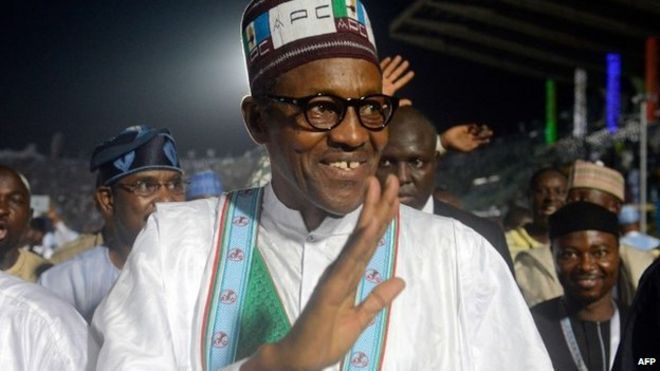 Nigeria’s former military ruler Muhammadu Buhari, 72, is not a quitter
Nigeria’s former military ruler Muhammadu Buhari, 72, is not a quitter
Defeated in the last three elections, he has returned to contest the highest office.
Mr Buhari faces incumbent President Goodluck Jonathan, who is from the southern Niger Delta region, for a second time at the polls in March.
It is a close race as on this occasion the Muslim northerner has been chosen as the candidate for the All Progressives Congress (APC) party, formed last year after four opposition parties merged.
The APC has also been attracting heavyweight defectors from the People’s Democratic Party (PDP), which has dominated the political scene since the end of military rule in 1999.
Mr Buhari has always been popular among the poor of the north (known as the “talakawa” in the north’s Hausa language).
Now some feel his military background and his disciplinarian credentials are just what the whole country needs to get to grips with the Islamist insurgency in the north.
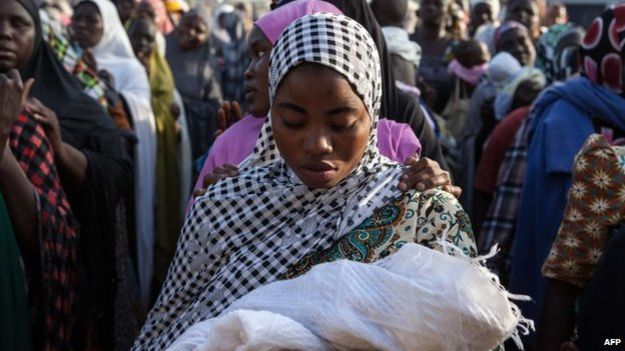
A Muslim from Daura in Katsina State, who has given his support to Sharia in the north, Mr Buhari has previously had to deny allegations that he has a radical Islamist agenda.
This proved a problem for him in the 2003 polls – he failed to secure much support among Christians in the south, where he was viewed with some suspicion.
But having escaped an attack on his convoy in Kaduna in July, which bore all the hallmarks of a Boko Haram assassination attempt, he has promised to end the insurgency within months if elected.
He has blamed President Jonathan’s weakness for its escalation and has refused overtures to participate in talks with the radical militant group.
His tough stance as a military commander in 1983 – when some Nigerian islands were annexed in Lake Chad by Chadian soldiers – is still remembered in the north-east, now the militants’ stronghold, after he blockaded the area and drove off the invaders.
‘War Against Indiscipline’
He ruled Nigeria from January 1984 until August 1985, taking charge after a military coup in December 1983.
It is a period remembered for a strict campaign against indiscipline and corruption, and for its human rights abuses.

Muhammadu Buhari in focus:
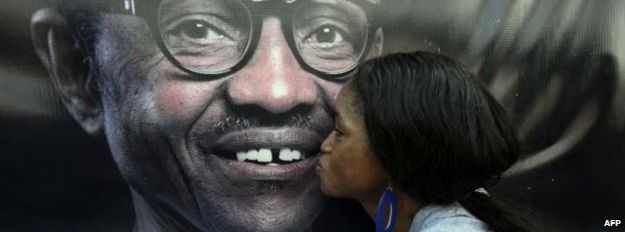
- Age 72
- Military ruler of Nigeria from 1984 to 1985
- Deposed in a coup
- Poor human rights record
- Seen as incorruptible
- Disciplinarian – civil servants late for work had to do frog jumps
- Muslim from northern Nigeria
- Survived an apparent Boko Haram assassination attempt

The verdict on Mr Buhari’s 20 months as Nigeria’s leader is mixed.
About 500 politicians, officials and businessmen were jailed as part of a campaign against waste and corruption.
Some saw this as the heavy-handed repression of military rule.
But others remember it as a praiseworthy attempt to fight the endemic graft that prevented Nigeria’s development.
He retains a rare reputation for honesty among Nigeria’s politicians, both military and civilian, largely because of this campaign.
As part of his “War Against Indiscipline”, he ordered Nigerians to form neat queues at bus stops, under the sharp eyes of whip-wielding soldiers.
Civil servants who were late for work were publicly humiliated by being forced to do frog jumps.
He also introduced a notorious decree to restrict press freedom, under which two journalists were jailed.
However, his attempts to re-balance public finances by curbing imports led to many job losses and the closure of businesses.
As part of anti-corruption measures, he also ordered that the currency be replaced – the colour of the naira notes were changed – forcing all holders of old notes to exchange them at banks within a limited period.
Prices rose while living standards fell, leading to a palace coup by Gen Ibrahim Babangida on 27 August 1985. Mr Buhari was imprisoned for 40 months.
Mr Babangida wanted to speed up the restoration of civilian rule, which Mr Buhari did not see as a priority.
‘Up to the people’
Mr Buhari has continued to defend his military coup of 31 December 1983.
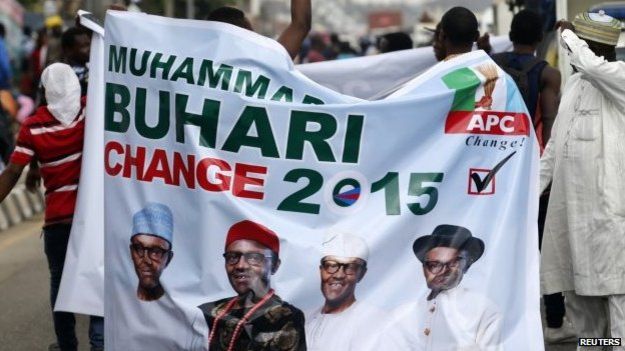
“It is up to the people. If you choose correct leadership, there won’t be any need for the military regime.
“The military came in when it was absolutely necessary and the elected people had failed the country,” he said in October 2005.
When former President Olusegun Obasanjo was a military ruler in the 1970s, Mr Buhari held the key post of minister of petroleum affairs.
But the relationship between the former colleagues cooled as Mr Buhari’s coup ousted a civilian government, led by Alhaji Shehu Shagari, who won elections organised by Mr Obasanjo.
This led to continuing questions about Mr Buhari’s commitment to democracy.
Relations between the two former generals may now thaw following what seems to be an endorsement for Mr Buhari from Mr Obasanjo in his recently released autobiography.
Mr Buhari “would not be a good economic manager”, wrote the politician who won two presidential elections for the PDP after 1999, but “will be a strong, almost inflexible, and a courageous and firm leader”.






























